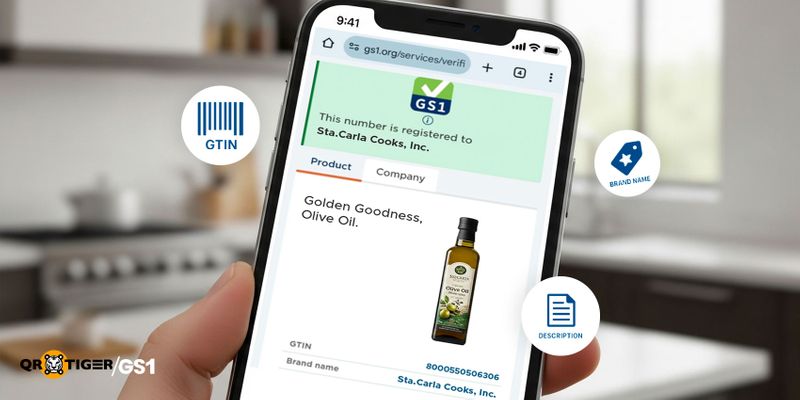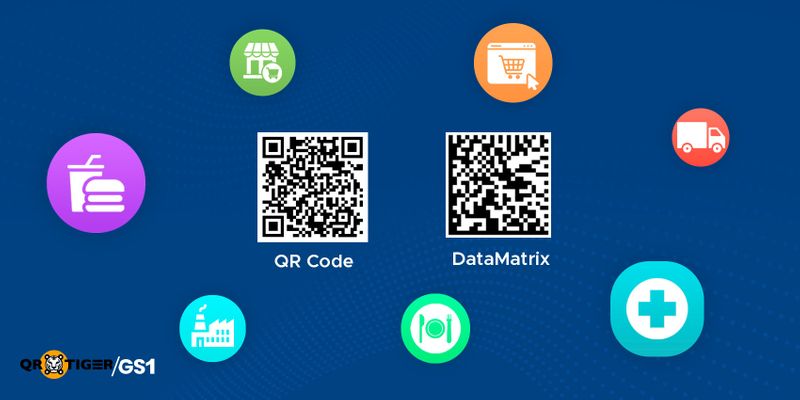GS1 South Africa: Driving Trusted Data in Supply Chains

South Africa’s supply chains are evolving rapidly. To meet regulatory demands, improve product traceability, and adapt to digital commerce, the industries encounter the need for standardized, trusted data.
From retail shelves to healthcare systems, businesses must ensure that product information is accurate, accessible, and interoperable across platforms and borders. GS1 South Africa supports this shift by providing global standards, digital tools, and trusted identification systems.
Through collaborative campaigns, innovative services, and the rollout of 2D barcodes, it helps companies optimize operations and build consumer trust. This blog discusses how GS1 ZA helps businesses adopt industry standards and drive transparent supply chains.
Table of Contents
What is GS1 South Africa?
Created in 1982, GS1 South Africa (ZA) was first known as the South African Numbering Association. It is the official provider of barcodes and global identification standards for South Africa and the Southern African Development Community (SADC) region, operating under the country prefixes 600 and 601.
It’s the only authorized entity licensed to issue GS1 barcodes and Global Trade Item Numbers (GTINs) in the area, it supports over 10,000 companies across industries, helping them optimize operations and ensure product traceability.
The member organization enables businesses to showcase inventory online with the same clarity and confidence as in-store experiences. This digital transformation facilitates safer, more efficient supply chains and builds consumer and patient trust.
It helps businesses unlock opportunities for global partnerships and drive sustainable growth across the region.
Contact information:
Address: Block D, Pinmill Farm, 164 Katherine Street, Barlow Park, Sandton, Johannesburg, South Africa
Contact no: +27 11 777 3300
Email: services@gs1za.org
Introduced initiatives and collaborated campaigns
GS1 ZA facilitates industry collaboration to improve supply chain visibility, efficiency & trust.
Partnership with Takealot
Takealot, South Africa’s leading e-commerce platform aims to boost customer confidence and ensure accurate product information. It integrated the Verified by GS1 service into its Seller and Supplier Portals. This allows sellers to validate their GTINs before listing products, ensuring that product data is accurate, reliable, and brand authorized.
The move promotes better data quality and accountability across the platform, helping Takealot maintain a smooth and transparent shopping experience.
By adopting GS1 standards, Takealot has improved operational efficiency with fewer listing errors and faster product onboarding. GTIN verification is currently optional, Takealot plans to make it mandatory and expand checks to include GS1 product attributes.
Strengthens SA’s Red Meat industry
GS1 ZA is playing a vital role in strengthening the country’s red meat industry by supporting a national livestock traceability initiative led by Red Meat Industry Services (RMIS).
Through this collaboration, the member organization is helping implement Global Location Numbers (GLNs) to uniquely identify farms, feedlots, abattoirs, and auction houses, creating a structured and transparent map of the livestock supply chain.
This system improves tracking, enhances disease outbreak response, and supports safer, more efficient operations across the industry.
By using GS1 standards, the initiative aims to boost data sharing, improve recall readiness, and support the country’s goal of achieving 20% export market growth by 2030.
The Africa Trade Desk
The Africa Trade Desk is a public-private platform launched by USAID through Prosper Africa, designed to connect African producers with major U.S. food retailers by optimizing logistics, insurance, and traceability across the supply chain.
GS1 supports the initiative by providing global standards for product identification and traceability, helping ensure secure, transparent trade from African farms to U.S. shelves. GS1 has partnered with USAID and Prosper Africa to enable digital traceability and compliance, especially for high-value exports like seafood, citrus, and herbs.
Partnership with VirtualRouteZ for the Fibre Traceability Initiative
The The Fibre Traceability Initiative, driven by VirtualRouteZ in collaboration with Filippa-K, GS1 Sweden, and the AxFoundation, marks a major step forward in fashion supply chain transparency.
The goal was ambitious but simple: create a fully traceable wool supply chain, from the sheep on the farm to the finished garment in the retail store.
Consumers can scan a QR code on each garment to access its full lifecycle, including care, repair, resell guidance, and compliance with the Responsible Wool Standard.
To make this possible, GS1 Global approved an unusual step. Instead of each supplier registering with their local GS1 office, all participants in this initiative, regardless of where they operate, must work directly with GS1 ZA. It was chosen to partner with VirtualRouteZ as the central authority for issuing identifiers and registering organizations under this project.
This setup breaks from the standard GS1 rule, where companies normally go to the GS1 office in their own country. In this case, the exception was made to ensure consistency and uniformity.
A centralized approach means the wool farmer in Sweden, the spinner in Italy, and the retailer in another part of the world are all tied into one system. This eliminates the risk of fragmented or mismatched data, creating a single source of truth for the entire value chain.
At the heart of this system is GS1 South Africa, which has a responsibility that extends beyond its national borders for this unique project.
Note: This exception only applies to companies opting for the Fibre Traceability Initiative. The standard GS1 system remains unchanged for all other cases, with companies registering identifiers through their local GS1 office.
GS1 ZA services for businesses
Various services by GS1 that let businesses optimize operations across industries are discussed below.
GS1 Activate
GS1 Activate is a service included in your membership when you register with GS1. It's designed to help you easily generate and manage your GTINs and barcode symbols online.
Once the product details are added to the platform, users can then generate GTINs, which are automatically connected to the GS1 Registry Platform, a global, centralized repository of product information.
The tool is especially useful for small businesses looking to grow and sell confidently in local and international markets.
Verified by GS1

The service helps authorize the validity of GS1 identifiers. By accessing information from the GS1 Registry Platform, users can determine whether a product’s GTIN and barcode are structured as per the GS1 standards and officially assigned by a GS1 member organization.
This tool strengthens supply chain integrity by verifying if a product’s identification number is licensed to the right company and whether the associated data matches official records. It plays a key role in boosting transparency, reducing errors, and building trust across trading partners.
Global Data Synchronization Network
The Global Data Synchronization Network (GDSN) is a worldwide system that lets businesses exchange trusted product data with their trading partners. Instead of each company managing separate versions of product details, GDSN connects suppliers and retailers through certified data pools.
When a supplier uploads product information, such as names, sizes, ingredients, dimensions, or packaging details, into their chosen data pool, that data is standardized and shared across the network.
Retailers and other partners linked to the same product receive the updated information automatically. This ensures everyone is working with the same, most up-to-date details.
By using GDSN, companies reduce errors in product listings, improve supply chain efficiency, and meet international data standards.
Unlike Verified by GS1, which provides a public way to check the validity of product identifiers (GTINs) and some basic product attributes, GDSN is focused on business-to-business data exchange. It provides more detailed product information to support accurate trading, compliance, and transparency between partners.
Alliance Partner Program
It connects solution providers with businesses that need help using GS1 standards. These partners offer services like barcode printing, packaging, software, and data management tools that follow GS1 guidelines.
By working with trusted partners, companies can easily adopt GS1 standards and improve how they manage products, inventory, and supply chains.
GS1 ZA checks and approves each partner to make sure they meet quality and compliance requirements. This gives businesses confidence that they’re getting reliable support. The program helps create a strong network where companies and service providers work together to boost efficiency and traceability across industries.
Item Measurement Service
The service helps businesses make sure their product information is correct and matches global standards. Manufacturers or suppliers first upload their product data, such as brand name, size, weight, and description on a portal called 1WorldSync. This data is then shared with retailers through Trusted Source.
GS1 ZA offers a dedicated facility to help ensure product data is accurate. Its team performs Item Measurement tests to verify key product details such as brand name, dimensions, weight, net content, description, and functional number.
This service covers checks on consumer units, shrink-wrapped items, and outer cases weighing up to 50kg. Note that the pallet measurements are not included in this service.
As the sole licensed MO of GS1 Global in South Africa, GS1 ZA follows GS1 GDSN Package Measurement rules to fully comply with global GS1 standards.
Barcode Verification Service
The service helps businesses check if their barcodes meet global standards before products go to market. Using specialized equipment, GS1 tests the barcode’s quality, readability, and printing accuracy to make sure it will scan properly across retail and supply chain systems. This reduces the risk of rejections, delays, or extra costs caused by faulty barcodes.
The service is especially useful for companies supplying to major retailers, where barcode performance is essential. GS1 ZA provides a detailed report with results and guidance, helping businesses fix any issues early. This ensures smoother product launches and builds trust with trading partners.
Barcode Estimator
This free online tool helps businesses estimate how many barcodes they need. It’s designed for companies that are new to GS1 and want to plan their barcode usage before registering.
By answering a few simple questions about your products and packaging, the tool gives a clear estimate of how many GTINs you’ll need. It also gives an early idea of how much the initial and renewal fees might cost.
This helps businesses avoid over- or under-ordering barcodes and ensures they’re prepared for retail and online sales. The Barcode Estimator is quick to use and gives you a better understanding of how GS1 barcodes fit into your product setup, making it easier to get started with GS1 standards.
Traceability
The GS1 traceability framework outlines the full journey of a product through the supply chain, from origin to final destination. It acts as a practical guide that helps businesses follow three key steps: identify items and locations, capture relevant data, and share that information securely and consistently.
By using GS1 standards like barcodes and data-sharing tools, companies can follow the movement of goods across the supply chain. This improves safety, reduces errors, and helps manage product recalls.
The framework supports industries such as food, healthcare, and retail by providing clear, reliable product information. It also helps businesses meet legal and trading partner requirements. With efficient product traceability in the supply chain, companies build trust with customers and improve how they manage inventory, logistics, and product quality.
Applications of 2D barcodes across industries in South Africa
By 2027, retail is set to embrace a smarter way of sharing product information through 2D barcodes. These upgraded codes can hold much more data than traditional 1D barcodes and unlock benefits like better traceability and stronger connections with consumers.
As a part of the GS1 Sunrise 2027 initiative, it serves as a step toward more transparent and efficient shopping experiences, both in-store and online. The shift isn’t mandatory yet, and businesses can still rely on 1D barcodes unless industry rules change.
To make the transition smoother, many brands are advised to use dual marking (printing both 1D and 2D codes on packaging). This approach keeps systems compatible while paving the way for future upgrades in retail technology.
Companies preparing for Sunrise 2027 can either create GS1-compliant 2D barcodes in-house by following GS1’s guidelines or use trusted third-party tools like QR Tiger’s GS1 QR code generator.
For businesses that lack time or technical resources, these external services offer quick, reliable support for barcode creation and integration, making the transition smoother.
Here are some of the key applications of these codes across industries in South Africa:

Retail
In the retail industry, 2D barcodes help stores and brands manage product information more accurately and efficiently. These barcodes carry more data than traditional ones, allowing retailers to track items by size, color, style, and season, especially useful in sectors like apparel and general merchandise.
They also support faster checkouts and better inventory control, helping businesses meet customer demands quickly. For example, a GS1 Digital Link QR code improves product visibility online and in-store by linking to verified data. This helps retailers share trusted information with customers, meet safety and traceability standards, and reduce errors.
Transport and logistics
The GS1’s Scan4Transport standard uses 2D barcodes to enable transport and logistics companies to track goods with greater accuracy and speed by embedding key details like product type, batch number, and expiry date. This improves visibility across the supply chain, helping teams reduce errors, manage deliveries, and quickly address issues such as damaged or missing items.
These barcodes also enhance data sharing between suppliers, retailers, and warehouses. Using GS1 Digital Link, logistics teams can scan a QR code to access all necessary handling and shipping information.
With this standard, shipment details, including destination, hazard alerts, and special instructions, can be encoded into a single smart label, optimizing operations and improving service quality.
Healthcare
In the healthcare industry, 2D barcodes play a key role in improving patient safety and product traceability. These barcodes can carry detailed information such as batch numbers, expiry dates, and product codes, which helps hospitals and pharmacies track medicines and medical devices more accurately.
This reduces the risk of errors and makes it easier to manage product recalls or spot counterfeit items. 2D barcodes also support better data sharing between manufacturers, healthcare providers and regulators.
Food
These barcodes help improve food safety and traceability in the country. They can carry detailed information like batch numbers, expiry dates, allergen info, and ingredients, making it easier to track products from farm to table.
This helps food businesses respond quickly to recalls, cut down on waste, and ensure that customers receive safe, high-quality products. 2D barcodes also support better data sharing between suppliers, retailers, and regulators. For example, by scanning a GS1 QR code, businesses can access all the key product details needed for storage, transport, and sale.
Technical industries
In industries like automotive, electronics, and engineering, 2D barcodes help companies manage complex product information more efficiently. These industries often deal with parts that need detailed tracking, such as serial numbers, batch codes, and manufacturing dates.
2D barcodes can store all this data in a compact format, making it simpler to trace items through production, assembly, and distribution. They also support better inventory control and faster data sharing between suppliers and customers. This helps companies boost productivity and build stronger, more reliable supply chains.
Inspiring success stories from GS1 ZA
The following success stories indicate how businesses have implemented GS1 services to drive innovation and solve practical challenges.
Netcare’s digital transformation
Netcare, one of South Africa’s biggest private healthcare providers, partnered with GS1 ZA. This is because it aims to upgrade its manual, paper-driven business and clinical systems by switching to fast, digital, and automated processes.
By using GS1 barcodes and product IDs, Netcare digitized its inventory system, reduced mistakes, and made hospital operations more efficient.
This gave nurses more time for patient care and ensured that medical items were properly traced and stocked. GS1 ZA also helped Netcare connect its suppliers to the GDSN, making product data sharing smooth and reliable. With most suppliers using GS1 barcodes, Netcare could link product details to patient records and act quickly during recalls.
Empowering South African Businesses through Global Standards
GS1 South Africa provides global standards that allow businesses to identify products uniquely, track them through supply chains, and share reliable data across industries. These standards improve efficiency, safety, and transparency in trade.
It also offers training, support, and collaboration opportunities. By licensing GS1 identifiers, businesses operating in South Africa gain access to essential tools, trusted data registries, and global best practices that strengthen their competitiveness in both local and international markets.
Frequently asked questions
What is the GS1 Sustainability Program?
The GS1 Sustainability Programme is a global initiative to help businesses use GS1 standards and data tools to respond to environmental challenges and emerging regulations.
It supports practices across the full product lifecycle, from sourcing through packaging, transport, and end-of-life, by enabling accurate, standardized identification, capture, and sharing of sustainability-related data.
Tools like barcodes, EPC/RFID (radio frequency identification) tags, master data standards, and digital attribute sharing allow companies to track product attributes such as materials, packaging, carbon footprint, and circularity.
This helps businesses meet regulatory requirements, reduce environmental impact, assure supply chain partners of responsible sourcing, and allow consumers to access trustworthy product information.
Where can I buy barcodes and GTINs for products sold in South Africa?
Barcodes and GTINs are not simply “bought”. They are licensed through a member organization, in this case, GS1 ZA.
- Visit the official Member Registration portal and fill out an application form.
- Submit essential documentation (such as an identification document, proof of address, and business registration proof).
- Identify the number of barcodes required aligning with your business’s operational needs.
- Once the application is reviewed and approved, GS1 ZA issues a GS1 Company Prefix that allows generating globally recognized identifiers like barcodes and GTINs.
This license must be renewed each year with a fee to ensure your GTINs and barcodes remain valid.
Who governs the GS1 ZA?
The member organization is guided by a Standards Technology Committee made up of important industry leaders and decision-makers who help set its direction and ensure its standards meet business needs.
People from big retailers, manufacturers, and other major players in South Africa’s economy. For example, Shoprite, Spar, Unilever, Tiger Brands, Rhodes Foods, and others.




